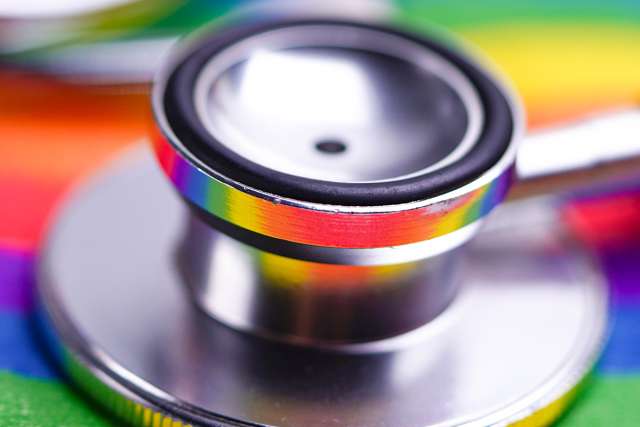Johnathan Kao, MD practices pediatrics and internal medicine at Downtown Los Angeles Primary & Specialty Care. His interests include HIV management and prevention and LGBTQ+ health. His experience includes providing care for patients living with HIV through the county health clinics, jail system and street medicine teams.
Because of his LGBTQ+ Champion designation, Dr. Kao notes that LGBTQ+-identified patients feel safe coming to him for primary care knowing they can be their authentic selves.
“Patients feel more comfortable talking about some of these issues, bringing up their sexual history, their identity, or just being able to express their concerns without feeling judged,” he says. In addition, the staff has patients’ pronouns readily available so they will not be misgendered and they’ll be assured respectful care.
UCLA Health has identified LGBTQ+ Champions in its network of physicians and specialists who have expertise and experience in providing health care to LGBTQ+-identified people and their families.
More than 50 UCLA Health providers have earned the LGBTQ+ Champion distinction since the program launched in 2017. Future providers can receive specialized training through the LGBTQ+ Primary Care Fellowship Program in the Department of Medicine.
LGBTQ+ Champion providers offer primary care, gender-affirming care, behavioral health, HIV care and more at 13 locations over 16 specialties. Locations include Beverly Hills, Santa Monica, Downtown L.A. and Torrance, along with nine other locations throughout the greater Los Angeles region. A list of providers by specialty can be found here.
“Part of our recruitment effort is to bring more providers that are interested in LGBTQ+ health into our health system and try to grow the locations,” says Emery Chang, MD, the LGBTQ+ medical director at UCLA Health and founding co-chair of the UCLA Health PRIDE Network Affinity Group. Further, he notes that there are efforts to develop additional student, resident and faculty development resources.
Filling the gaps
The LGBTQ+ Champion provider designation was created in 2017 in response to the Human Rights Campaign Foundation’s Healthcare Equality Index, a benchmarking tool that evaluates health care facilities’ policies and practices related to LGBTQ+ care. While all UCLA team members care for all patients equitably, LGBTQ+ Champion providers are committed to pursuing ongoing education in caring for the LGBTQ+ population.
The program is helping fill a longstanding gap in providing quality care to LGBTQ+-identified individuals. Visiting a primary care physician for annual wellness exams and age- and gender-appropriate screenings reduces the risk for disease, disabilities and premature death. Yet a variety of barriers – including fear of discrimination or of being misunderstood – lead many in the LGBTQ+ community to delay or forego seeing a primary care physician.
“It’s very well described in our medical literature that LGBTQ+ people have greater difficulty with access to care or in finding a provider who knows about their needs and finding a space where they feel safe and their experiences are understood,” says Amy Weimer, MD, co-founder of the UCLA Gender Health Program. “The primary goal for the LGBTQ+ Champion designation was to ensure that our patients knew about spaces that were specialized for their needs in hopes that this would improve access and care experiences for our patients.
“In addition, our LGBTQ+ Champion providers have provided a ready pool of educators when LGBTQ education is needed, whether at the School of Medicine or for residents or fellows.”
Individualized training is available for those interested, says Dr. Weimer.
“We find people come into their interest in becoming an LGBTQ+ Champion sometimes with a wealth of experience and education, so we don’t mandate training that’s the same for each person if it’s not appropriate to where that person is in their career and the work they do,” she says. “We have people individually describe and attest to what education they’ve had and what experiences they’ve had, and we support them if they need ongoing education or resources.”
Trust is key
Rebecca Rada, DO, MBA, agrees that establishing a trusting relationship is key. Dr. Rada, who is nonbinary and uses they/them pronouns, practices family medicine at Beverly Hills Wilshire Primary Care. Their practice focuses on gender health for kids and adults, LGBTQ+ primary care and HIV prevention and treatment. They note that being discriminated against or misunderstood is a common fear in the LGBTQ+ community, which makes many hesitant to come in and establish care.
“For example, a lot of trans men and nonbinary patients who have a cervix still need pap smears based on guidelines we use for cis females,” Dr. Rada explains. “But a lot of patients have dysphoria revolving around their anatomy, so it can be difficult for them to even talk to a provider about getting an exam.”
Dr. Rada recalls a patient who, after a year of coming to the clinic, told them he never thought he would be able to be his true self and be so open with a health care provider in his lifetime.
“He was so grateful, and it felt wonderful to be able to provide that to him,” Dr. Rada says. “To get that feedback was great. But it’s also humbling because I feel like I’m just doing what I love to do and have the privilege of getting to take care of the people in my community.”
Jennifer Karmarkar is the author of this article






